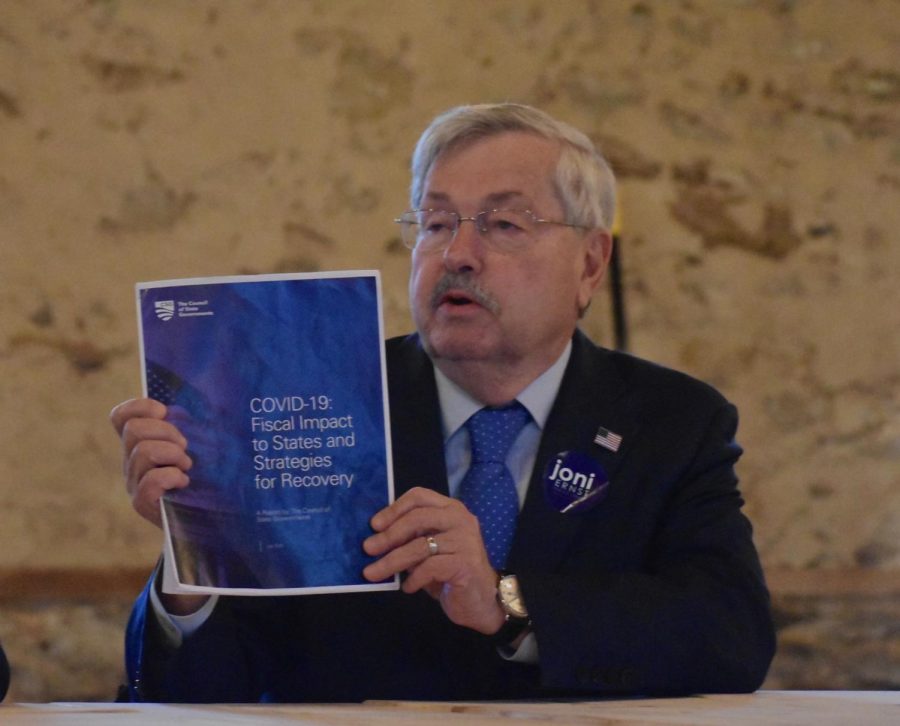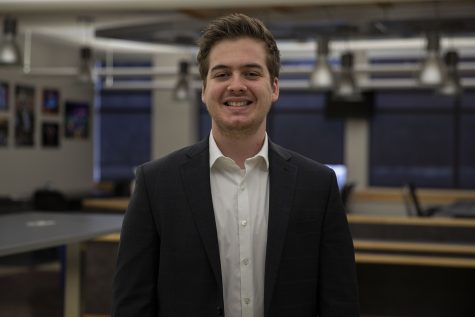Terry Branstad denies conflict of interest in Eric Branstad’s involvement in China
Terry Branstad said he had taken steps to ensure transparency while serving as the ambassador to China, and that his son, Eric Branstad, had not benefited off his influence in the country.
Ambassador Terry Branstand discusses the financial impact of COVID-19 on Iowa’s economy at The Palmer House Stable on Tuesday, Oct. 20.
October 20, 2020
Former Iowa Gov. and Ambassador to China Terry Branstad said his son, Eric Branstad, did not benefit from the elder Branstad’s post as ambassador, deflecting a recent report from The Intercept that Eric Branstad used his father’s influence to his personal benefit.
“I want to make it clear that I would in no way benefit or profit, or any member of my family, from the dealings in China,” Terry Branstad said at a press event in Solon, Iowa.
As one of many stops around the state on Tuesday, Branstad was in Solon with Mariannette Miller-Meeks, the Republican candidate for Iowa’s 2nd Congressional District, and state Rep. Bobby Kaufmann, the Republican incumbent candidate for Iowa’s 73rd House District. Branstad was also joined by A.J. Catsimatidis, the vice chair of the New York State Republican Party and the chair of the Manhattan Republican Party.
The Oct. 15 report from The Intercept details trips Eric Branstad took to China while employed by the lobbying group Mercury Public Affairs, and suggests he gained from his father’s influence in the country, depicting him as having a role in Chinese business dealings during his time at the U.S. Commerce Department.
Eric Branstad, who accompanied his father to the event in Solon, said the article was a left-wing attack and an attempt to influence the election.
“The accusations from the left-wing blog are completely unfounded and purely laughable,” he told reporters.
Terry Branstad denied claims that his son had used his influence for business dealings in China, and he said he has taken steps to ensure transparency during his time as ambassador. He said he sold shares in John Deere and Hormel Foods — who both have operations in China — before starting as ambassador to avoid the image that he was profiting off the position.
The Intercept report drew comparisons between the younger Branstad and Hunter Biden, the son of Democratic presidential candidate Joe Biden, who was accused by President Trump of profiting off his father’s position in both Ukraine and China.
“My son has done nothing to profit from China, unlike the situation with Hunter Biden,” Terry Branstad said on Tuesday. “I guess what really bothers me about politics today is that people make these crazy accusations.”
Terry Branstad also commended Iowa Republicans, including Gov. Kim Reynolds, for their handling of the coronavirus pandemic and the state’s financial resiliency during the pandemic.
An August report by the Council of State Governments analyzing the fiscal impact of COVID-19 on states found Iowa’s budget to be the most resilient in the country. The study weighed several factors, including the amount in a state’s rainy-day fund, debt coverage, and state Medicaid cost.
Branstad said Reynolds has continued fiscal prudence in the state’s budget that he practiced while he was governor.
“Kim Reynolds has not only continued those practices and learned everything I taught her, but she’s improved on it,” he said. “So I’ve got to give her and the Republican Legislature credit.”
Iowa’s seven-day average for new coronavirus cases has been above 1,000 since Oct. 11, according to the New York Times, a number not reached in the seven-day average since Sept. 2. A record 534 Iowans are hospitalized with COVID-19, according to the state’s coronavirus website.
Branstad has been supportive of Reynolds’ response to the virus, and he said while China has largely controlled the virus, it has done so with lockdown and surveillance measures that wouldn’t be tolerated in the U.S.
“When they have a problem they just start locking people up, separating families, things that you could not do in this country and people wouldn’t put up with, but it has been effective,” he said.

Miller-Meeks echoed those sentiments, saying there are health costs to shutting down life and the economy. She said people have died from not accessing health care, and that lockdowns can exacerbate mental-health issues and substance use problems.
“There are real-life consequences to shutting down an economy and locking people up,” she said. “This is not an easy decision for elected leaders to make. Because they’re trying to balance trying to keep as many people safe as possible, but also to allow us to have some economic interchange.”















